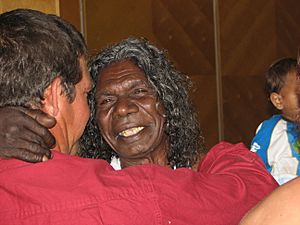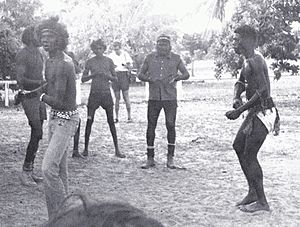David Gulpilil facts for kids
Quick facts for kids
David Gulpilil
|
|
|---|---|

Gulpilil in 2006
|
|
| Born |
Gulpilil Ridjimiraril Dalaithngu
1 July 1953 Arnhem Land, Northern Territory, Australia
|
| Died | 29 November 2021 (aged 68) Murray Bridge, South Australia, Australia
|
| Years active | 1971–2019 |
| Spouse(s) | Robyn Djunginy Airlie Thomas Miriam Ashley |
| Awards | Best Actor in a Leading Role 2002 The Tracker |
David Gulpilil Ridjimiraril (1 July 1953 – 29 November 2021) was a famous Indigenous Australian actor and dancer. He was known professionally as David Gulpilil. After his death, for a short time, he was also known as David Dalaithngu out of cultural respect.
He starred in many well-known films. These include Walkabout, Storm Boy, Crocodile Dundee, Rabbit-Proof Fence, and The Tracker.
David Gulpilil was one of the Yolngu people. He grew up following traditional ways in Arnhem Land, in northern Australia. He was a very skilled dancer from a young age. British director Nicolas Roeg noticed his amazing talent. David Gulpilil also performed on stage. He received many awards for his films and for his work over his lifetime. He also wrote books and created artworks.
Contents
Early Life and Background
David Gulpilil was likely born in 1953. He once said he didn't know his exact age. Missionaries recorded his birth on July 1, 1953, based on their best guess. He belonged to the Mandjalpingu clan of the Yolngu people. The Yolngu are an Aboriginal people from Arnhem Land in Australia's Northern Territory.
Growing Up in the Bush
As a young boy, Gulpilil was a talented hunter and tracker. He was also a skilled ceremonial dancer. He spent his childhood living in the bush. He did not see a non-Aboriginal person until he was about eight years old.
He had a traditional upbringing with his family. After his parents passed away, he went to school in Maningrida. There, he was given the name "David". When he became an adult, he was initiated into the Mandhalpuyngu tribal group. The name Gulpilil means "kingfisher". His home country was Marwuyu.
After his first film, Walkabout (1971), Gulpilil learned to speak English very well. He already knew several Aboriginal languages.
A Career in Film and Dance

Starting in Film
In 1969, David Gulpilil's amazing tribal dancing caught the eye of British filmmaker Nicolas Roeg. Roeg was looking for film locations in Maningrida. He quickly cast the 16-year-old Gulpilil in a main role in his film Walkabout. The movie came out in 1971 and was praised around the world.
Before this, white actors often played Aboriginal characters in Australia. Gulpilil's natural charm and his acting and dancing skills made him famous instantly. He traveled internationally to promote the film. He met many important people, including John Lennon, Bob Marley, and Jimi Hendrix. He even taught Bob Marley how to play the didgeridoo!
More Film and TV Roles
David Gulpilil appeared in many more films and TV shows. He had a lead role in the popular film Storm Boy (1976). He also gave a powerful performance in The Last Wave (1977).
A documentary about his life, Gulpilil: One Red Blood, was shown on ABC Television in 2003. The title comes from his quote: "We are all one blood. No matter where we are from, we are all one blood, the same."
Gulpilil was a big influence in both dance and film throughout his life. He helped create and narrated the film Ten Canoes. This film won a special award at the 2006 Cannes Film Festival. It was based on a 1,000-year-old traditional story. The film featured Aboriginal actors who spoke their local language. Gulpilil worked with director Rolf de Heer on this film. De Heer also directed Gulpilil in The Tracker (2002).
In 2014, Gulpilil worked with Rolf de Heer again on Charlie's Country. He even shared the screenwriting credit for this film. Charlie's Country won several awards, including Best Actor for Gulpilil at the Cannes Film Festival.
In 2015, Gulpilil appeared in the documentary Another Country. In this film, he told his life story. He spoke about growing up on his traditional land and the arrival of white people. He often used humor to talk about serious issues.
He worked with director Molly Reynolds again on My Name Is Gulpilil. This documentary about his life premiered in 2021. Gulpilil was known for showing Aboriginal culture in his films. He often felt like he was balancing two worlds: his traditional culture and the modern film world.
Stage Performances
In March 2004, David Gulpilil performed in a play called Gulpilil. It was about his own life and was shown at the Adelaide Festival of Arts. The audience loved it. The play included stories from making Walkabout and performing for Queen Elizabeth II at Buckingham Palace. The show was also performed in Brisbane and Sydney.
He also performed on stage at the Sydney Opera House in 1974. He danced for Queen Elizabeth II and Prince Philip in Brisbane in 1982.
Dancing Skills
David Gulpilil was perhaps the most famous traditional dancer in Australia. He put together groups of dancers and musicians. They performed at festivals all over the country. He won the prestigious Darwin Australia Day Eisteddfod dance competition four times.
In 1997, Gulpilil's dance group performed at a national Aboriginal dance conference in Adelaide. They also gave a free concert.
Writing and Art
Besides his work in dance, music, film, and TV, Gulpilil was also a great storyteller. He wrote two children's books based on Yolngu beliefs. These books included photos and drawings by Australian artists. They showed Gulpilil's deep respect for his homeland's landscape, people, and traditional culture.
A painting by Gulpilil, called King brown snake with blue tongue lizard at Gulparil waterhole, is in the Art Gallery of South Australia. He painted it between 2013 and 2014.
Awards and Recognition
David Gulpilil received many honors for his contributions. He was made a Member of the Order of Australia (AM) in 1987. He also received the Centenary Medal in 2001.
He won the AACTA/AFI Award for Best Actor in a Leading Role twice. He won for The Tracker in 2002 and for Charlie's Country in 2014. He was also nominated for Storm Boy in 1977. In 2003, he received the first Don Dunstan Award at the Adelaide Film Festival.
In 2004, a portrait of Gulpilil by Craig Ruddy won the Archibald Prize. This is Australia's most famous art prize.
In 2013, Gulpilil received the Red Ochre Award. This award is given each year to an outstanding Indigenous Australian artist for their lifetime achievements.
In May 2014, Gulpilil won a Best Actor award at the Cannes Film Festival. This was for his role in Rolf de Heer's film Charlie's Country.
In 2019, Gulpilil received a lifetime achievement award at the NAIDOC Awards. He also won the Premier's Award for Lifetime Achievement at the South Australian Ruby Awards.
In June 2021, artist Thomas Readett created a huge permanent mural in Adelaide. It features black-and-white images of Gulpilil's early and later life. Also in June 2021, Gulpilil was honored with a star on Winton's Walk of Fame.
In August 2021, an exhibition called Djungi Gulpilil (Gulpilil family) was held in Adelaide. It showed art by many of his family members, including his twin sister and brother. The exhibition celebrated his life.
At the 11th AACTA Awards in December 2021, Gulpilil was officially given the Longford Lyell Award. This award recognized his great contribution to the Australian film industry. His face was projected onto the Sydney Opera House on the night of the award ceremony.
Later Life and Passing
David Gulpilil was diagnosed with terminal lung cancer in 2017. He stopped acting in 2019. Because of his illness, he could not attend the 2019 NAIDOC Awards to receive his lifetime achievement award.
David Gulpilil passed away at his home in Murray Bridge, South Australia, on November 29, 2021. After his death, his family asked that he be called David Dalaithngu for a period of time. This was to follow a traditional Aboriginal custom of not naming the dead. Many news articles respected this wish.
Many people shared tributes to David Gulpilil. These included political leaders, actors like Hugh Jackman, and film critics. His family and community elders also shared their memories. News outlets around the world published tributes.
On December 2, 2021, his family and the Yolngu community gave permission for all of his names to be used again. They said David wanted people to remember his name and his work. He was proud of his storytelling through film and wanted it to be shared for future generations.
Family Life
David Gulpilil had seven children: Jida, Milan, Makia, Andrew, Jamie, Phoebe, and Malakai. His son Jida is a musician and actor. Witiyana Marika, a Yolngu elder and musician from the band Yothu Yindi, is also considered his son by traditional law.
Many of his family members are artists. His twin sister, Mary Dhapalany, is a leading weaver. His brother, Peter Minygululu, is known for his storytelling and detailed artworks. His nephew, Bobby Bununggurr, is a singer and dancer. David and Bobby traveled widely together in the 1970s and 1980s, performing and singing.
Filmography
Film
| Year | Film | Role | Notes |
|---|---|---|---|
| 1971 | Walkabout | Black boy | credited as David Gumpilil |
| 1976 | Storm Boy | Fingerbone Bill | Nominated—AACTA Award for Best Actor |
| 1977 | The Last Wave | Chris Lee | credited as Gulpilil |
| 1983 | The Right Stuff | Aborigine | |
| 1986 | Crocodile Dundee | Neville Bell | |
| 1991 | Until the End of the World | David | |
| 2002 | The Tracker | The Tracker | AACTA Award for Best Actor |
| 2002 | Rabbit-Proof Fence | Moodoo | Nominated—AACTA Award for Best Supporting Actor |
| 2005 | The Proposition | Jacko | |
| 2006 | Ten Canoes | The Storyteller | |
| 2008 | Australia | King George | |
| 2013 | Satellite Boy | Jagamarra | |
| 2014 | Charlie's Country | Charlie | AACTA Award for Best Actor Cannes Film Festival Un Certain Regard for Best Actor |
| 2016 | Goldstone | Jimmy | |
| 2017 | Cargo | Daku | |
| 2018 | Storm Boy | Father of Fingerbone Bill | |
| 2021 | My Name is Gulpilil | Himself |
Television
| Year | Title | Role | Notes |
|---|---|---|---|
| 1972 | Boney | Various roles | 5 episodes |
| 1976 | Rush | Satchel | episode: "The Kadaitcha Man" |
| 1977 | The Outsiders | Billy Potter | episode: "Sophie’s Mob" |
| 1979 | Skyways | Koiranah | episode: "Koiranah" |
| 1980 | The Timeless Land | Bennelong | |
| 1995 | The Man from Snowy River | Manulpuy | episode: "The Savage Land" |
| 2000 | BeastMaster | Shaman | episode: "Valhalla" |
| 2017 | The Leftovers | Christopher Sunday | 2 episodes |
|
 | James Van Der Zee |
 | Alma Thomas |
 | Ellis Wilson |
 | Margaret Taylor-Burroughs |

